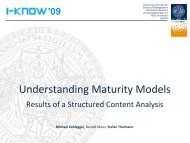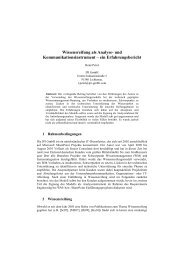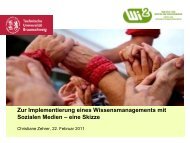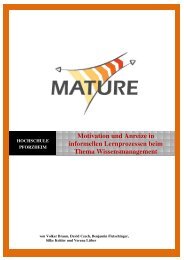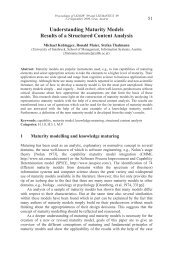MATURE Deliverable 1. - Knowledge Maturing
MATURE Deliverable 1. - Knowledge Maturing
MATURE Deliverable 1. - Knowledge Maturing
You also want an ePaper? Increase the reach of your titles
YUMPU automatically turns print PDFs into web optimized ePapers that Google loves.
2 Introduction<br />
Year 1 of <strong>MATURE</strong> has been characterised by a number of parallel strands of activities the ultimate aim<br />
of which is to establish a profound knowledge base of concepts and theories as well as practices of<br />
knowledge maturing. The role of WP1 in this is (1) to collect and analyze empirical evidence about<br />
knowledge maturing in general for developing a common understanding and to revise the knowledge<br />
maturing model and (2) to contribute to the various requirements engineering and design activities,<br />
particularly the development of use cases as well as requirements for the planned <strong>MATURE</strong> software.<br />
This is in line with the participatory design process that <strong>MATURE</strong> takes towards software development.<br />
Building on the results of the ethnographic study which is the first in a series of empirical studies, the<br />
knowledge maturing model has been revised as empirical data has been taken as a first “reality check” for<br />
the initial knowledge maturing model. Implications for requirements have been collected as part of<br />
deliverables developed in WPs 2-6 for which the results have provided a rich source of experience for<br />
requirements engineering as well as direct contact of developers with potential application contexts to<br />
inspire and guide ideas. Lastly, steps towards preparing a representative study planned for Year 2 have<br />
been taken that will be used to test assumptions created in the ethnographic study. This deliverable reports<br />
on Year 1 achievements of <strong>MATURE</strong> towards the objectives of work package 1, particularly to<br />
• establish a common knowledge base about the different domains, concepts and theories required<br />
to understand and support the knowledge maturing process,<br />
• explore current knowledge maturing practices, e.g., routines, processes, knowledge types and<br />
semantics,<br />
• develop a reference model for describing knowledge maturing.<br />
These objectives are reflected in the following tasks that the consortium has worked on during the first<br />
year:<br />
• T<strong>1.</strong>1 Compilation of the scientific and technological state of the art and current trends. This has<br />
been written up in the <strong>MATURE</strong> Wiki until M6 and will be briefly summarized in this<br />
deliverable,<br />
• T<strong>1.</strong>2 Explorative empirical studies. Work on WP1 in the first year has been particularly intensive<br />
with respect to a collaborative ethnographic study that has been performed by <strong>MATURE</strong> partners<br />
and involves <strong>MATURE</strong> application partners as well as several <strong>MATURE</strong> associate partners,<br />
• T<strong>1.</strong>4 Development of the conceptual knowledge maturing model. The results of T<strong>1.</strong>1 and T<strong>1.</strong>2<br />
have been fed into a substantial and concise refinement of the initial knowledge maturing model<br />
as presented in the Description of Work taking on board particularly the results of the<br />
ethnographic study and the input by and feedback of application partners voiced in meetings,<br />
workshops, e.g., on design studies (see WP 2,3 and 4).<br />
The overview given in Figure 1 shows the main activities of this phase and their primary use within this<br />
work package and concerning other work packages and the corresponding deliverables represented by<br />
arrows. The ethnographic study provides rich material about knowledge maturing practices, cases and<br />
personas which have impacted the parallel activities in WPs 2-6. The results of the empirical study,<br />
particularly long-running knowledge maturing cases, stories about changes in knowledge maturity,<br />
indicators for knowledge maturing and hot knowledge maturing areas, have been primary resources for<br />
the revision of the knowledge maturing model together with the description of the state-of-the-art<br />
concerning knowledge maturing brought to the project by the members of the consortium and an<br />
extensive review of the literature.<br />
10



